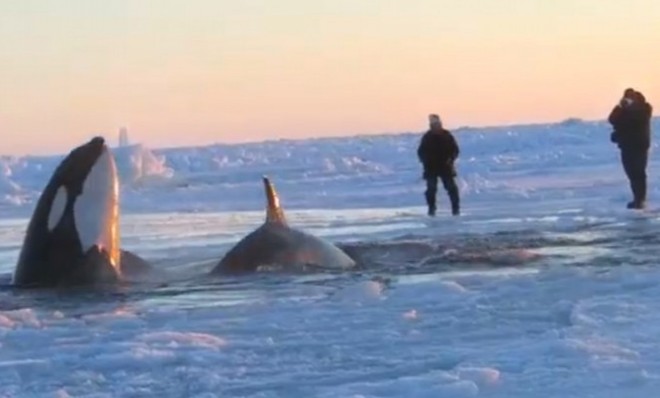The race to save a pod of killer whales trapped in arctic ice [Updated]
If the whales' small hole freezes over, they will drown


A free daily email with the biggest news stories of the day – and the best features from TheWeek.com
You are now subscribed
Your newsletter sign-up was successful
A pod of killer whales has been discovered trapped in arctic waters that are quickly freezing around them. (Watch a video above.) The dozen or so whales, which need to come up for air to survive, have seen their small hole in the Hudson Bay shrink since they were found earlier this week. If it closes, they will drown.
The mayor of the small Inuit town of Inukjuak has requested help from the Canadian government. Conceivably, icebreakers could help solve the problem, but the equipment may not get there in time — it's quite far away, and there are other missions the icebreakers are being used for. On Thursday, Canada's Department of Fisheries and Oceans said it was sending a team to assess the situation, but couldn't promise to find a solution.
In the meantime, Inukjuak residents have taken to social media for help, spreading a video of the orcas that shows them repeatedly coming up for air. Activists are using hashtags #SaveQuebecWhales and #BigMiracle to help get traction on Twitter. "It is absolutely tragic to think about this, you know, if that does close up," says Deborah Giles, a graduate student researcher at the University of California.
The Week
Escape your echo chamber. Get the facts behind the news, plus analysis from multiple perspectives.

Sign up for The Week's Free Newsletters
From our morning news briefing to a weekly Good News Newsletter, get the best of The Week delivered directly to your inbox.
From our morning news briefing to a weekly Good News Newsletter, get the best of The Week delivered directly to your inbox.
It's unclear how the whales came to the area, as they don't normally travel into icy waters. Some experts suspect warming oceans have encouraged the whales to swim further north than they usually would, leaving them trapped when those warm waters suddenly freeze.
Paul Wade, a research fisheries biologist at NOAA's National Marine Mammal Laboratory in Seattle, says it's possible the whales could keep the hole open themselves simply by "continually coming up every minute or so." But villagers say the pod often disappears, probably in search of another opening that will lead them into the open water — which is 12 miles from the hole.
Update: Local villagers report the sea ice surrounding the whales has shifted, allowing the pod to escape into open water. Hooray!
A free daily email with the biggest news stories of the day – and the best features from TheWeek.com
Jessica Hullinger is a writer and former deputy editor of The Week Digital. Originally from the American Midwest, she completed a degree in journalism at Indiana University Bloomington before relocating to New York City, where she pursued a career in media. After joining The Week as an intern in 2010, she served as the title’s audience development manager, senior editor and deputy editor, as well as a regular guest on “The Week Unwrapped” podcast. Her writing has featured in other publications including Popular Science, Fast Company, Fortune, and Self magazine, and she loves covering science and climate-related issues.
-
 Why is the Trump administration talking about ‘Western civilization’?
Why is the Trump administration talking about ‘Western civilization’?Talking Points Rubio says Europe, US bonded by religion and ancestry
-
 Quentin Deranque: a student’s death energizes the French far right
Quentin Deranque: a student’s death energizes the French far rightIN THE SPOTLIGHT Reactions to the violent killing of an ultraconservative activist offer a glimpse at the culture wars roiling France ahead of next year’s elections
-
 Secured vs. unsecured loans: how do they differ and which is better?
Secured vs. unsecured loans: how do they differ and which is better?the explainer They are distinguished by the level of risk and the inclusion of collateral
